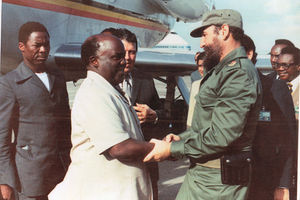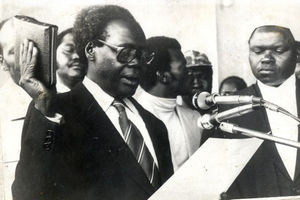
Left to right: Members of the Military Commission Maj Zed Maruru, Mr Yoweri Museveni, Mr Paulo Muwanga, Maj Gen Tito Okello and Lt Col Oyite-Ojok. PHOTOS/ FILE
Forty four years ago, (May 12, 1980) the six-member Military Commission headed by Paul Muwanga, who was to later become former president Milton Obote’s vice president, took control of government a day after the curtain was brought down on Godfrey Binaisa’s 11 months as president.
The Commission was comprised of Yoweri Museveni, Col Tito Okello Lutwa, Lt Col David Oyite-Ojok, Lt Col William Omaria, and Maj Zed Maruru.
The circumstances under which Binaisa was ousted, 11 months after he had taken over from Prof Yusuf Lule, have always been the subject of some interesting revelations, even debate, that pointed to “a fierce power struggle” between him and very powerful people in the Uganda National Liberation Front/Army (UNLF/A).
Those disagreements came to the fore on the evening of May 10, 1980, when Radio Uganda broadcast an announcement to the effect that Oyite-Ojok had been booted from the all-powerful post of army chief of staff and named Uganda’s ambassador to Algeria.
The announcement indicated that the move was precipitated by “the deteriorating security situation in Uganda” and a “near breakdown of relations between the civilian government and the army”.
That was, however, not the only significant part of the radio broadcast. The other was that Yoweri Museveni, then minister of Defence, who was also the leader of the Front for National Salvation (Fronasa), had been sacked.
Moments before the announcements in which he declared himself minister of Defence, with Mr Christopher Okoth as State minister in the same docket were broadcast, Binaisa had met up with a group of British and Canadian business personalities, who he assured would be operating in a conducive environment if they were to set up businesses here.
Events of the next few hours and days suggested otherwise.
Trouble
It would look like the announcements served to cause Museveni and Oyite-Ojok, two adversaries in an intense military and possibly political rivalry who had been affected, to agree on something – the removal of Binaisa.
That evening, UNLA soldiers loyal to the two men stormed and surrounded the Nile Mansions Hotel where most of the ministers worked and lived.
The following day, another batch of soldiers took over Radio Uganda and announced that Oyite-Ojok was “still chief of staff of the army”. Binaisa, however, blamed the seizure of Radio Uganda on the Tanzania Peoples’ Defence Forces (TPDF).
“I would like to see my brother [former Tanzania president] Julius Nyerere stopping this kind of attitude by his troops, moving them back to Kampala, seizing the radio and hand it back to us,” he later wrote.
Binaisa, who referred to those who had ousted him as rebels, accused Nyerere of being “definitely biased in favour of the rebels”.
The soldiers at Radio Uganda had in the meantime declared that the National Consultative Council (NCC), an organ of the Uganda National Liberation Front (UNLF) which served as Uganda’s Parliament after the ouster of Idi Amin, would be urgently convened to discuss the developments.
Museveni role
It was always known that Mr Museveni had been heavily involved in Binaisa’s instatement on June 20, 1979, and his removal on May 12, 1980, but the extent of the involvement remained the subject of conjecture, at least until 2010.
During Binaisa’s interment in Nateete on August 10, 2010, Mr Museveni revealed that he was the one who had helped the deceased former president rise to power, but that he later fell out with him because the deceased former president had allowed himself to be manipulated by people that Mr Museveni described as “political schemers”.
“Our calculation was scientific. I decided that we needed to get rid of Binaisa because he had become a liability,” Mr Museveni told mourners.
Mr Museveni further revealed that he had been angered by Binaisa’s decision to sack him from Cabinet.
“How could my friend who I brought sack me as a minister on radio? That is how I fell out with Binaisa,” Mr Museveni explained.
Binaisa confined
It should, however, be noted that Binaisa was placed under house arrest in State House Entebbe, which was surrounded by a contingent of about 150 men and soldiers of the TPDF.
Binaisa claimed that he had appealed to Nyerere through an emissary, to be set free, but that Nyerere’s response had been that TPDF would protect him from harm until a “safe house, driver and guard” could be found for him.
According to The Washington Post of May 18, 1980, TPDF had “isolated him and kept him incommunicado”.
“Tanzanian troops who control Entebbe have turned all reporters away from the State House. Binaisa’s aides, friends and staff at the presidential residence were forced to leave this weekend,” said the newspaper.
The newspaper reported that the men and officers of TPDF who were in charge at Entebbe had turned away reporters from The Washington Post, The New York Times and The Sunday Times.
Quoting James Barr, an American educational consultant who had lived with Binaisa in State House for a month before the ouster, the paper reported that Binaisa hoped that he would “get outside assistance” to overturn the coup.

Former US President Jimmy Carter.
Appealing to Carter, Thatcher
The newspaper further reported that Binaisa had, however, managed to smuggle past his captors a letter in which he sought the help of then United States president Jimmy Carter.
The Washington Post reported that Binaisa had appealed to president Carter for special assistance based on his many years as a lawyer in New York.
“I think that as a member of the bar of one of the biggest states in the country, I am entitled to the kind of protection and persuasion which the president of the United States can muster,” he wrote.

Margaret Thatcher.
In his letter to Carter, Binaisa claimed that he was a “virtual prisoner” for carrying out “the unforgivable sin” of arranging for the country’s first elections in 18 years to be held in December 1980.
“The rebels and their friends are working for former president [Milton] Obote and don’t want elections because they are not sure he would be elected,” The Washington Times quoted him to have written.
In the same letter, he is said to have scathingly criticised Nyerere for “aiding and abetting the rebels” who had kicked him out of power. He then asked Carter, to “please help when there is still time”.
“Please make my brother Nyerere see reason by withdrawing recognition from the rebel government. His attitude is causing all democrats in Uganda and Africa great concern. Usually he heads the list in condemning military coups elsewhere but this time he has for no known reason transferred his affections to a military takeover,” he wrote in the letters which were delivered through diplomatic channels in London.
It at the time looked odd that Nyerere, then a long-time opponent of military coups in Africa, would side with those that had ousted Binaisa.
He also sent out a letters to then British prime minister Margaret Thatcher.
Some of the demands contained in the letters to Carter and Thatcher were repeated in a so-called secret letter that Binaisa claimed to have sent to Nyerere. It is not clear whether the said letter was ever delivered to Nyerere.
Appeal to Nimeiri
One of the calls for assistance was sent to then president of Sudan, Gen Jaafar Nimeri.
“I don’t know where they are taking me. I don’t know whether they will kill me,” he wrote in his letter to Nimeiri.
It should, however, be noted that Binaisa’s letters did not make specific pleas for military aid or the use of violence to counter the coup, but James Barr, later told The Washington Times that the ousted president had thought that Sudan and Kenya could be asked to move in an intervene.
The intervention did not come.
It was at the time believed that Kenya and Sudan would not be willing to commit troops to such an intervention for fear of being sucked into an inter-African warfare with Tanzania, which at that time had an estimated 10,000 soldiers in Uganda.





